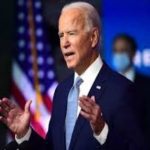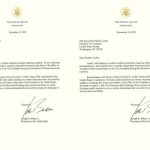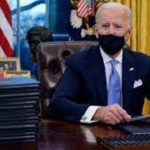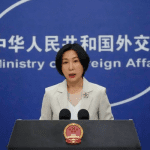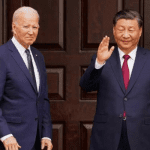President Joe Biden starkly warned he will protect America against Chinese threats to its sovereignty and singled out President Xi Jinping – a striking escalation of a suspected spy balloon showdown during his State of the Union address.
Biden called out Beijing on Tuesday before millions of viewers in the US and around the world as diplomatic tensions with China soar and new details emerge of an expansive Chinese balloon surveillance program.
In the highly symbolic choreography of the US-Chinese relationship, Biden’s statements were unusually direct and raise questions about how Beijing will respond, even if his tone spoke to a charged domestic political context as Republicans complain he was too slow to shoot down the balloon.
Sailors assigned to Explosive Ordnance Disposal Group 2 recover debris from a high-altitude surveillance balloon off the coast of Myrtle Beach, South Carolina, February. 5, 2023.
Spy balloon part of a broader Chinese military surveillance operation, US intel sources say
Biden said in his speech in the House of Representatives that he had told Xi that Washington seeks “competition, not conflict.” But he also said that US investments in its alliances, military and advanced technologies meant that America was now in its strongest position in decades to compete with China and defend its interests.
“Make no mistake: as we made clear last week, if China threatens our sovereignty, we will act to protect our country. And we did,” Biden said, referring to the moment Saturday when a US jet fired a missile that burst the balloon off the US east coast, after it had spent days wafting across the continental US and Canada.
Biden’s comments were in a theatrical setting and were partly designed to create political cover. But a president warning China not to infringe US sovereignty was still a remarkable moment that underlined a grave geopolitical shift.
Moments later, in an ad-libbed addition to his speech, Biden specifically named Xi, as he slammed autocracies and argued for the superiority of democracies.
“Name me a world leader who’d change places with Xi Jinping. Name me one!” Biden said of his Chinese counterpart, whom he last met in Indonesia last year and has known for years. The president was almost shouting at the end of a sentence that could be seen as disdainful of China’s stunning economic emergence at a time when Xi’s aura has been damaged by mismanagement of Covid-19.
Biden’s speech mostly concentrated on domestic issues. But his address came at a moment of geopolitical turmoil, when the United States is simultaneously confronting another nuclear rival: Russia. He hailed the Western effort to counter President Vladimir Putin’s invasion of Ukraine and vowed to Kyiv’s ambassador, who was in the audience: “We are going to stand with you as long as it takes.”
A rare united front in Washington
There’s almost nothing that unifies Democrats and Republicans in Washington.
But Biden’s comments underscored how opposition to China, which has been crystalizing here for several years, has now become a rallying and unifying point in US politics. China has long mounted a broad intelligence campaign against the US, using satellites, cyber and traditional methods of collection. The US also has extensive intelligence operations targeting China. But the sight of a balloon tracking across the US, visible from the ground and on blanket television coverage, encapsulated a potential threat to US sovereignty from China as never before amid talk that a new Cold War may be dawning.
Biden’s frank comments also served as an important milestone in the increasingly tumultuous competition between the US and China. For much of the past 20 years, US policy had been designed to usher China into the global system as a competitor but not an adversary, including with its entry into the World Trade Organization. But China’s huge economic growth and increasingly diplomatic belligerence has many Americans now considering that approach a failure. The US shift to talking about establishing guardrails for the relationship and for the need to protect the Western-led rules-based international system is resented in China and seen as an attempt to check its rightful destiny as a world power.
President Joe Biden starkly warned he will protect America against Chinese threats to its sovereignty and singled out President Xi Jinping – a striking escalation of a suspected spy balloon showdown during his State of the Union address.
Biden called out Beijing on Tuesday before millions of viewers in the US and around the world as diplomatic tensions with China soar and new details emerge of an expansive Chinese balloon surveillance program.
In the highly symbolic choreography of the US-Chinese relationship, Biden’s statements were unusually direct and raise questions about how Beijing will respond, even if his tone spoke to a charged domestic political context as Republicans complain he was too slow to shoot down the balloon.
Sailors assigned to Explosive Ordnance Disposal Group 2 recover debris from a high-altitude surveillance balloon off the coast of Myrtle Beach, South Carolina, February. 5, 2023.
Spy balloon part of a broader Chinese military surveillance operation, US intel sources say
Biden said in his speech in the House of Representatives that he had told Xi that Washington seeks “competition, not conflict.” But he also said that US investments in its alliances, military and advanced technologies meant that America was now in its strongest position in decades to compete with China and defend its interests.
“Make no mistake: as we made clear last week, if China threatens our sovereignty, we will act to protect our country. And we did,” Biden said, referring to the moment Saturday when a US jet fired a missile that burst the balloon off the US east coast, after it had spent days wafting across the continental US and Canada.
Biden’s comments were in a theatrical setting and were partly designed to create political cover. But a president warning China not to infringe US sovereignty was still a remarkable moment that underlined a grave geopolitical shift.
Moments later, in an ad-libbed addition to his speech, Biden specifically named Xi, as he slammed autocracies and argued for the superiority of democracies.
“Name me a world leader who’d change places with Xi Jinping. Name me one!” Biden said of his Chinese counterpart, whom he last met in Indonesia last year and has known for years. The president was almost shouting at the end of a sentence that could be seen as disdainful of China’s stunning economic emergence at a time when Xi’s aura has been damaged by mismanagement of Covid-19.
Biden’s speech mostly concentrated on domestic issues. But his address came at a moment of geopolitical turmoil, when the United States is simultaneously confronting another nuclear rival: Russia. He hailed the Western effort to counter President Vladimir Putin’s invasion of Ukraine and vowed to Kyiv’s ambassador, who was in the audience: “We are going to stand with you as long as it takes.”
A rare united front in Washington
There’s almost nothing that unifies Democrats and Republicans in Washington.
But Biden’s comments underscored how opposition to China, which has been crystalizing here for several years, has now become a rallying and unifying point in US politics. China has long mounted a broad intelligence campaign against the US, using satellites, cyber and traditional methods of collection. The US also has extensive intelligence operations targeting China. But the sight of a balloon tracking across the US, visible from the ground and on blanket television coverage, encapsulated a potential threat to US sovereignty from China as never before amid talk that a new Cold War may be dawning.
Biden’s frank comments also served as an important milestone in the increasingly tumultuous competition between the US and China. For much of the past 20 years, US policy had been designed to usher China into the global system as a competitor but not an adversary, including with its entry into the World Trade Organization. But China’s huge economic growth and increasingly diplomatic belligerence has many Americans now considering that approach a failure. The US shift to talking about establishing guardrails for the relationship and for the need to protect the Western-led rules-based international system is resented in China and seen as an attempt to check its rightful destiny as a world power.
President Joe Biden starkly warned he will protect America against Chinese threats to its sovereignty and singled out President Xi Jinping – a striking escalation of a suspected spy balloon showdown during his State of the Union address.
Biden called out Beijing on Tuesday before millions of viewers in the US and around the world as diplomatic tensions with China soar and new details emerge of an expansive Chinese balloon surveillance program.
In the highly symbolic choreography of the US-Chinese relationship, Biden’s statements were unusually direct and raise questions about how Beijing will respond, even if his tone spoke to a charged domestic political context as Republicans complain he was too slow to shoot down the balloon.
Sailors assigned to Explosive Ordnance Disposal Group 2 recover debris from a high-altitude surveillance balloon off the coast of Myrtle Beach, South Carolina, February. 5, 2023.
Spy balloon part of a broader Chinese military surveillance operation, US intel sources say
Biden said in his speech in the House of Representatives that he had told Xi that Washington seeks “competition, not conflict.” But he also said that US investments in its alliances, military and advanced technologies meant that America was now in its strongest position in decades to compete with China and defend its interests.
“Make no mistake: as we made clear last week, if China threatens our sovereignty, we will act to protect our country. And we did,” Biden said, referring to the moment Saturday when a US jet fired a missile that burst the balloon off the US east coast, after it had spent days wafting across the continental US and Canada.
Biden’s comments were in a theatrical setting and were partly designed to create political cover. But a president warning China not to infringe US sovereignty was still a remarkable moment that underlined a grave geopolitical shift.
Moments later, in an ad-libbed addition to his speech, Biden specifically named Xi, as he slammed autocracies and argued for the superiority of democracies.
“Name me a world leader who’d change places with Xi Jinping. Name me one!” Biden said of his Chinese counterpart, whom he last met in Indonesia last year and has known for years. The president was almost shouting at the end of a sentence that could be seen as disdainful of China’s stunning economic emergence at a time when Xi’s aura has been damaged by mismanagement of Covid-19.
Biden’s speech mostly concentrated on domestic issues. But his address came at a moment of geopolitical turmoil, when the United States is simultaneously confronting another nuclear rival: Russia. He hailed the Western effort to counter President Vladimir Putin’s invasion of Ukraine and vowed to Kyiv’s ambassador, who was in the audience: “We are going to stand with you as long as it takes.”
A rare united front in Washington
There’s almost nothing that unifies Democrats and Republicans in Washington.
But Biden’s comments underscored how opposition to China, which has been crystalizing here for several years, has now become a rallying and unifying point in US politics. China has long mounted a broad intelligence campaign against the US, using satellites, cyber and traditional methods of collection. The US also has extensive intelligence operations targeting China. But the sight of a balloon tracking across the US, visible from the ground and on blanket television coverage, encapsulated a potential threat to US sovereignty from China as never before amid talk that a new Cold War may be dawning.
Biden’s frank comments also served as an important milestone in the increasingly tumultuous competition between the US and China. For much of the past 20 years, US policy had been designed to usher China into the global system as a competitor but not an adversary, including with its entry into the World Trade Organization. But China’s huge economic growth and increasingly diplomatic belligerence has many Americans now considering that approach a failure. The US shift to talking about establishing guardrails for the relationship and for the need to protect the Western-led rules-based international system is resented in China and seen as an attempt to check its rightful destiny as a world power.
President Joe Biden starkly warned he will protect America against Chinese threats to its sovereignty and singled out President Xi Jinping – a striking escalation of a suspected spy balloon showdown during his State of the Union address.
Biden called out Beijing on Tuesday before millions of viewers in the US and around the world as diplomatic tensions with China soar and new details emerge of an expansive Chinese balloon surveillance program.
In the highly symbolic choreography of the US-Chinese relationship, Biden’s statements were unusually direct and raise questions about how Beijing will respond, even if his tone spoke to a charged domestic political context as Republicans complain he was too slow to shoot down the balloon.
Sailors assigned to Explosive Ordnance Disposal Group 2 recover debris from a high-altitude surveillance balloon off the coast of Myrtle Beach, South Carolina, February. 5, 2023.
Spy balloon part of a broader Chinese military surveillance operation, US intel sources say
Biden said in his speech in the House of Representatives that he had told Xi that Washington seeks “competition, not conflict.” But he also said that US investments in its alliances, military and advanced technologies meant that America was now in its strongest position in decades to compete with China and defend its interests.
“Make no mistake: as we made clear last week, if China threatens our sovereignty, we will act to protect our country. And we did,” Biden said, referring to the moment Saturday when a US jet fired a missile that burst the balloon off the US east coast, after it had spent days wafting across the continental US and Canada.
Biden’s comments were in a theatrical setting and were partly designed to create political cover. But a president warning China not to infringe US sovereignty was still a remarkable moment that underlined a grave geopolitical shift.
Moments later, in an ad-libbed addition to his speech, Biden specifically named Xi, as he slammed autocracies and argued for the superiority of democracies.
“Name me a world leader who’d change places with Xi Jinping. Name me one!” Biden said of his Chinese counterpart, whom he last met in Indonesia last year and has known for years. The president was almost shouting at the end of a sentence that could be seen as disdainful of China’s stunning economic emergence at a time when Xi’s aura has been damaged by mismanagement of Covid-19.
Biden’s speech mostly concentrated on domestic issues. But his address came at a moment of geopolitical turmoil, when the United States is simultaneously confronting another nuclear rival: Russia. He hailed the Western effort to counter President Vladimir Putin’s invasion of Ukraine and vowed to Kyiv’s ambassador, who was in the audience: “We are going to stand with you as long as it takes.”
A rare united front in Washington
There’s almost nothing that unifies Democrats and Republicans in Washington.
But Biden’s comments underscored how opposition to China, which has been crystalizing here for several years, has now become a rallying and unifying point in US politics. China has long mounted a broad intelligence campaign against the US, using satellites, cyber and traditional methods of collection. The US also has extensive intelligence operations targeting China. But the sight of a balloon tracking across the US, visible from the ground and on blanket television coverage, encapsulated a potential threat to US sovereignty from China as never before amid talk that a new Cold War may be dawning.
Biden’s frank comments also served as an important milestone in the increasingly tumultuous competition between the US and China. For much of the past 20 years, US policy had been designed to usher China into the global system as a competitor but not an adversary, including with its entry into the World Trade Organization. But China’s huge economic growth and increasingly diplomatic belligerence has many Americans now considering that approach a failure. The US shift to talking about establishing guardrails for the relationship and for the need to protect the Western-led rules-based international system is resented in China and seen as an attempt to check its rightful destiny as a world power.
President Joe Biden starkly warned he will protect America against Chinese threats to its sovereignty and singled out President Xi Jinping – a striking escalation of a suspected spy balloon showdown during his State of the Union address.
Biden called out Beijing on Tuesday before millions of viewers in the US and around the world as diplomatic tensions with China soar and new details emerge of an expansive Chinese balloon surveillance program.
In the highly symbolic choreography of the US-Chinese relationship, Biden’s statements were unusually direct and raise questions about how Beijing will respond, even if his tone spoke to a charged domestic political context as Republicans complain he was too slow to shoot down the balloon.
Sailors assigned to Explosive Ordnance Disposal Group 2 recover debris from a high-altitude surveillance balloon off the coast of Myrtle Beach, South Carolina, February. 5, 2023.
Spy balloon part of a broader Chinese military surveillance operation, US intel sources say
Biden said in his speech in the House of Representatives that he had told Xi that Washington seeks “competition, not conflict.” But he also said that US investments in its alliances, military and advanced technologies meant that America was now in its strongest position in decades to compete with China and defend its interests.
“Make no mistake: as we made clear last week, if China threatens our sovereignty, we will act to protect our country. And we did,” Biden said, referring to the moment Saturday when a US jet fired a missile that burst the balloon off the US east coast, after it had spent days wafting across the continental US and Canada.
Biden’s comments were in a theatrical setting and were partly designed to create political cover. But a president warning China not to infringe US sovereignty was still a remarkable moment that underlined a grave geopolitical shift.
Moments later, in an ad-libbed addition to his speech, Biden specifically named Xi, as he slammed autocracies and argued for the superiority of democracies.
“Name me a world leader who’d change places with Xi Jinping. Name me one!” Biden said of his Chinese counterpart, whom he last met in Indonesia last year and has known for years. The president was almost shouting at the end of a sentence that could be seen as disdainful of China’s stunning economic emergence at a time when Xi’s aura has been damaged by mismanagement of Covid-19.
Biden’s speech mostly concentrated on domestic issues. But his address came at a moment of geopolitical turmoil, when the United States is simultaneously confronting another nuclear rival: Russia. He hailed the Western effort to counter President Vladimir Putin’s invasion of Ukraine and vowed to Kyiv’s ambassador, who was in the audience: “We are going to stand with you as long as it takes.”
A rare united front in Washington
There’s almost nothing that unifies Democrats and Republicans in Washington.
But Biden’s comments underscored how opposition to China, which has been crystalizing here for several years, has now become a rallying and unifying point in US politics. China has long mounted a broad intelligence campaign against the US, using satellites, cyber and traditional methods of collection. The US also has extensive intelligence operations targeting China. But the sight of a balloon tracking across the US, visible from the ground and on blanket television coverage, encapsulated a potential threat to US sovereignty from China as never before amid talk that a new Cold War may be dawning.
Biden’s frank comments also served as an important milestone in the increasingly tumultuous competition between the US and China. For much of the past 20 years, US policy had been designed to usher China into the global system as a competitor but not an adversary, including with its entry into the World Trade Organization. But China’s huge economic growth and increasingly diplomatic belligerence has many Americans now considering that approach a failure. The US shift to talking about establishing guardrails for the relationship and for the need to protect the Western-led rules-based international system is resented in China and seen as an attempt to check its rightful destiny as a world power.
President Joe Biden starkly warned he will protect America against Chinese threats to its sovereignty and singled out President Xi Jinping – a striking escalation of a suspected spy balloon showdown during his State of the Union address.
Biden called out Beijing on Tuesday before millions of viewers in the US and around the world as diplomatic tensions with China soar and new details emerge of an expansive Chinese balloon surveillance program.
In the highly symbolic choreography of the US-Chinese relationship, Biden’s statements were unusually direct and raise questions about how Beijing will respond, even if his tone spoke to a charged domestic political context as Republicans complain he was too slow to shoot down the balloon.
Sailors assigned to Explosive Ordnance Disposal Group 2 recover debris from a high-altitude surveillance balloon off the coast of Myrtle Beach, South Carolina, February. 5, 2023.
Spy balloon part of a broader Chinese military surveillance operation, US intel sources say
Biden said in his speech in the House of Representatives that he had told Xi that Washington seeks “competition, not conflict.” But he also said that US investments in its alliances, military and advanced technologies meant that America was now in its strongest position in decades to compete with China and defend its interests.
“Make no mistake: as we made clear last week, if China threatens our sovereignty, we will act to protect our country. And we did,” Biden said, referring to the moment Saturday when a US jet fired a missile that burst the balloon off the US east coast, after it had spent days wafting across the continental US and Canada.
Biden’s comments were in a theatrical setting and were partly designed to create political cover. But a president warning China not to infringe US sovereignty was still a remarkable moment that underlined a grave geopolitical shift.
Moments later, in an ad-libbed addition to his speech, Biden specifically named Xi, as he slammed autocracies and argued for the superiority of democracies.
“Name me a world leader who’d change places with Xi Jinping. Name me one!” Biden said of his Chinese counterpart, whom he last met in Indonesia last year and has known for years. The president was almost shouting at the end of a sentence that could be seen as disdainful of China’s stunning economic emergence at a time when Xi’s aura has been damaged by mismanagement of Covid-19.
Biden’s speech mostly concentrated on domestic issues. But his address came at a moment of geopolitical turmoil, when the United States is simultaneously confronting another nuclear rival: Russia. He hailed the Western effort to counter President Vladimir Putin’s invasion of Ukraine and vowed to Kyiv’s ambassador, who was in the audience: “We are going to stand with you as long as it takes.”
A rare united front in Washington
There’s almost nothing that unifies Democrats and Republicans in Washington.
But Biden’s comments underscored how opposition to China, which has been crystalizing here for several years, has now become a rallying and unifying point in US politics. China has long mounted a broad intelligence campaign against the US, using satellites, cyber and traditional methods of collection. The US also has extensive intelligence operations targeting China. But the sight of a balloon tracking across the US, visible from the ground and on blanket television coverage, encapsulated a potential threat to US sovereignty from China as never before amid talk that a new Cold War may be dawning.
Biden’s frank comments also served as an important milestone in the increasingly tumultuous competition between the US and China. For much of the past 20 years, US policy had been designed to usher China into the global system as a competitor but not an adversary, including with its entry into the World Trade Organization. But China’s huge economic growth and increasingly diplomatic belligerence has many Americans now considering that approach a failure. The US shift to talking about establishing guardrails for the relationship and for the need to protect the Western-led rules-based international system is resented in China and seen as an attempt to check its rightful destiny as a world power.
President Joe Biden starkly warned he will protect America against Chinese threats to its sovereignty and singled out President Xi Jinping – a striking escalation of a suspected spy balloon showdown during his State of the Union address.
Biden called out Beijing on Tuesday before millions of viewers in the US and around the world as diplomatic tensions with China soar and new details emerge of an expansive Chinese balloon surveillance program.
In the highly symbolic choreography of the US-Chinese relationship, Biden’s statements were unusually direct and raise questions about how Beijing will respond, even if his tone spoke to a charged domestic political context as Republicans complain he was too slow to shoot down the balloon.
Sailors assigned to Explosive Ordnance Disposal Group 2 recover debris from a high-altitude surveillance balloon off the coast of Myrtle Beach, South Carolina, February. 5, 2023.
Spy balloon part of a broader Chinese military surveillance operation, US intel sources say
Biden said in his speech in the House of Representatives that he had told Xi that Washington seeks “competition, not conflict.” But he also said that US investments in its alliances, military and advanced technologies meant that America was now in its strongest position in decades to compete with China and defend its interests.
“Make no mistake: as we made clear last week, if China threatens our sovereignty, we will act to protect our country. And we did,” Biden said, referring to the moment Saturday when a US jet fired a missile that burst the balloon off the US east coast, after it had spent days wafting across the continental US and Canada.
Biden’s comments were in a theatrical setting and were partly designed to create political cover. But a president warning China not to infringe US sovereignty was still a remarkable moment that underlined a grave geopolitical shift.
Moments later, in an ad-libbed addition to his speech, Biden specifically named Xi, as he slammed autocracies and argued for the superiority of democracies.
“Name me a world leader who’d change places with Xi Jinping. Name me one!” Biden said of his Chinese counterpart, whom he last met in Indonesia last year and has known for years. The president was almost shouting at the end of a sentence that could be seen as disdainful of China’s stunning economic emergence at a time when Xi’s aura has been damaged by mismanagement of Covid-19.
Biden’s speech mostly concentrated on domestic issues. But his address came at a moment of geopolitical turmoil, when the United States is simultaneously confronting another nuclear rival: Russia. He hailed the Western effort to counter President Vladimir Putin’s invasion of Ukraine and vowed to Kyiv’s ambassador, who was in the audience: “We are going to stand with you as long as it takes.”
A rare united front in Washington
There’s almost nothing that unifies Democrats and Republicans in Washington.
But Biden’s comments underscored how opposition to China, which has been crystalizing here for several years, has now become a rallying and unifying point in US politics. China has long mounted a broad intelligence campaign against the US, using satellites, cyber and traditional methods of collection. The US also has extensive intelligence operations targeting China. But the sight of a balloon tracking across the US, visible from the ground and on blanket television coverage, encapsulated a potential threat to US sovereignty from China as never before amid talk that a new Cold War may be dawning.
Biden’s frank comments also served as an important milestone in the increasingly tumultuous competition between the US and China. For much of the past 20 years, US policy had been designed to usher China into the global system as a competitor but not an adversary, including with its entry into the World Trade Organization. But China’s huge economic growth and increasingly diplomatic belligerence has many Americans now considering that approach a failure. The US shift to talking about establishing guardrails for the relationship and for the need to protect the Western-led rules-based international system is resented in China and seen as an attempt to check its rightful destiny as a world power.
President Joe Biden starkly warned he will protect America against Chinese threats to its sovereignty and singled out President Xi Jinping – a striking escalation of a suspected spy balloon showdown during his State of the Union address.
Biden called out Beijing on Tuesday before millions of viewers in the US and around the world as diplomatic tensions with China soar and new details emerge of an expansive Chinese balloon surveillance program.
In the highly symbolic choreography of the US-Chinese relationship, Biden’s statements were unusually direct and raise questions about how Beijing will respond, even if his tone spoke to a charged domestic political context as Republicans complain he was too slow to shoot down the balloon.
Sailors assigned to Explosive Ordnance Disposal Group 2 recover debris from a high-altitude surveillance balloon off the coast of Myrtle Beach, South Carolina, February. 5, 2023.
Spy balloon part of a broader Chinese military surveillance operation, US intel sources say
Biden said in his speech in the House of Representatives that he had told Xi that Washington seeks “competition, not conflict.” But he also said that US investments in its alliances, military and advanced technologies meant that America was now in its strongest position in decades to compete with China and defend its interests.
“Make no mistake: as we made clear last week, if China threatens our sovereignty, we will act to protect our country. And we did,” Biden said, referring to the moment Saturday when a US jet fired a missile that burst the balloon off the US east coast, after it had spent days wafting across the continental US and Canada.
Biden’s comments were in a theatrical setting and were partly designed to create political cover. But a president warning China not to infringe US sovereignty was still a remarkable moment that underlined a grave geopolitical shift.
Moments later, in an ad-libbed addition to his speech, Biden specifically named Xi, as he slammed autocracies and argued for the superiority of democracies.
“Name me a world leader who’d change places with Xi Jinping. Name me one!” Biden said of his Chinese counterpart, whom he last met in Indonesia last year and has known for years. The president was almost shouting at the end of a sentence that could be seen as disdainful of China’s stunning economic emergence at a time when Xi’s aura has been damaged by mismanagement of Covid-19.
Biden’s speech mostly concentrated on domestic issues. But his address came at a moment of geopolitical turmoil, when the United States is simultaneously confronting another nuclear rival: Russia. He hailed the Western effort to counter President Vladimir Putin’s invasion of Ukraine and vowed to Kyiv’s ambassador, who was in the audience: “We are going to stand with you as long as it takes.”
A rare united front in Washington
There’s almost nothing that unifies Democrats and Republicans in Washington.
But Biden’s comments underscored how opposition to China, which has been crystalizing here for several years, has now become a rallying and unifying point in US politics. China has long mounted a broad intelligence campaign against the US, using satellites, cyber and traditional methods of collection. The US also has extensive intelligence operations targeting China. But the sight of a balloon tracking across the US, visible from the ground and on blanket television coverage, encapsulated a potential threat to US sovereignty from China as never before amid talk that a new Cold War may be dawning.
Biden’s frank comments also served as an important milestone in the increasingly tumultuous competition between the US and China. For much of the past 20 years, US policy had been designed to usher China into the global system as a competitor but not an adversary, including with its entry into the World Trade Organization. But China’s huge economic growth and increasingly diplomatic belligerence has many Americans now considering that approach a failure. The US shift to talking about establishing guardrails for the relationship and for the need to protect the Western-led rules-based international system is resented in China and seen as an attempt to check its rightful destiny as a world power.




